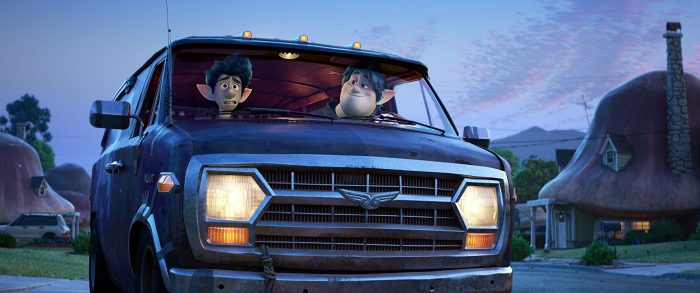‘Onward’ Review: When It Comes to Pixar, “Okay” Doesn’t Feel Like Enough

It took only a few minutes after I left the Onward screening for a distressing thought to settle in my mind. Rare is the Pixar film that disappoints. Rarer still is the Pixar film that tells a story that arguably could’ve been in live-action, not animation. Considering that the story in question, Onward, has characters including a manticore, centaurs, elves, and sprites, you might think that’s impossible. While Onward is a distinctly colorful animated film, its story feels like a variant on a low-key dramedy you might find at Sundance.
Onward, to be clear, has perfectly good intentions. Frankly, I feel somewhat bad for being disappointed at the film built from those intentions. Director Dan Scanlon (Monsters University) was inspired by the death of his father when he was an infant to tell the story of two brothers who try to bring back their dead father for a 24-hour period. The twist here is that the world of Onward is populated entirely with mythical creatures who have eschewed their magical powers in favor of things like electricity, cars, restaurants, and more. So it’s not just that the brothers are bringing back their dead dad, it’s that they have to find a gem to complete the magical spell that can revive him. Except the spell only lasts 24 hours, and the incomplete spell only brought back their dad’s bottom half.
The core story of Onward, though, has nothing to do with magic. The mythical setting is window dressing for a two-hander character study, between the awkward and nerdy Ian (voiced by Tom Holland) and his louder, more confident and more headstrong older brother Barley (Chris Pratt, in a role that Jack Black would’ve had a decade ago). The day-long road-trip journey involves the two brothers getting into various hijinks, while also becoming closer emotionally, in a kind of generic arc that Pratt does his very best to transcend. (His vocal performance is the film’s highlight, as he returns to his Andy Dwyer days.)
Onward’s setting is one of its truly original flourishes, while also hewing to one of Pixar’s now most formulaic notions: “What if the human world, but without humans?” That’s how you get the situational humor in A Bug’s Life, Monsters, Inc., Cars, and Finding Nemo. Sometimes, the humor works very, very well. Yet the situational humor in Onward is fleeting, partially derived from the surface-level concept that magical creatures just…stopped using magic, because it was too hard to master.
The other main problem with Onward is tied to the other formulaic notion driving Pixar these days. To reiterate, this is a film whose premise is as follows. The hero has never known his father aside from errant photos, retold memories, and an old cassette tape with audio of his voice. Now, he has just 24 hours to forge some kind of connection with his old man before he vanishes forever. Such a premise, as genuinely tied to its filmmaker’s past as it may be, feels like a surprisingly intense attempt to wring tears from the audience, from a studio that specializes in tearjerkers like they have stock in Kleenex. The emotion in Onward is earned, and the situational setup seems unique. It’s all…fine, but also overly familiar.
This is what a disappointing Pixar film is: a perfectly fine one. Emotional hook aside, there’s a surface-level approach throughout, even to Ian and Barley, in the hopes that the voice performers can do the heavy lifting instead of character development. Ian is vaguely nerdy and awkward, and thus, we have the latest Spider-Man to sound vaguely nerdy and awkward in a fairly rote performance. (Tom Holland has now had three straight voice performances in two months, and it might be time to put him back in front of the camera instead.) His fellow MCU cohort Pratt proves he’s maybe more adept in a recording booth, able to reach hidden depths without ever seeing his face. In smaller roles, Julia Louis-Dreyfus and Octavia Spencer play, respectively, Ian and Barley’s mother, and a once-powerful manticore whose priorities have changed drastically. Spencer is having fun even if the dialogue she’s working with isn’t stellar.
It’s a little odd to hear Louis-Dreyfus in the film, if only because this is not her first rodeo with Pixar. That, of course, would be the studio’s sophomore effort, A Bug’s Life, in which she played the female lead. It’s almost telling, though undoubtedly unintentional, that one of the film’s few major roles goes to someone who happened to star in a now fairly underrated effort that has always been almost proudly formulaic. A Bug’s Life, too, is driven by situational humor and an adventurous quest. The benefit the film boasted was simple: it came early in Pixar’s run.
Onward occupies a very strange spot for Pixar. In the last four years of the 2010s, the studio released five films, and four of those were sequels. Yes, it’s only been a couple years since Coco, but it feels like we’ve waited a lot more time for an original Pixar story. It’s an unequivocally good thing that Pixar is making original films this year, with Soul also arriving this summer. And Onward is a decent, well-paced, well-animated, moderately enjoyable film. It’s got a good message, an emotional third act, and some pleasantly surprising jokes. Onward is…OK. The problem with Onward is that Pixar’s original films are incredible. OK is, simply, just not good enough.
/Film Rating: 5 out of 10
The post ‘Onward’ Review: When It Comes to Pixar, “Okay” Doesn’t Feel Like Enough appeared first on /Film.
from /Film https://ift.tt/32d0tVp
No comments: